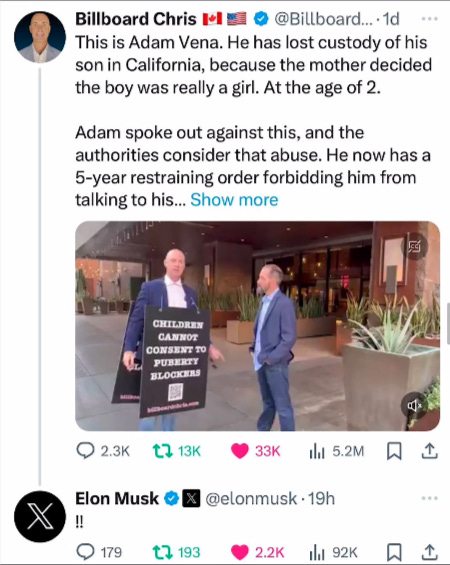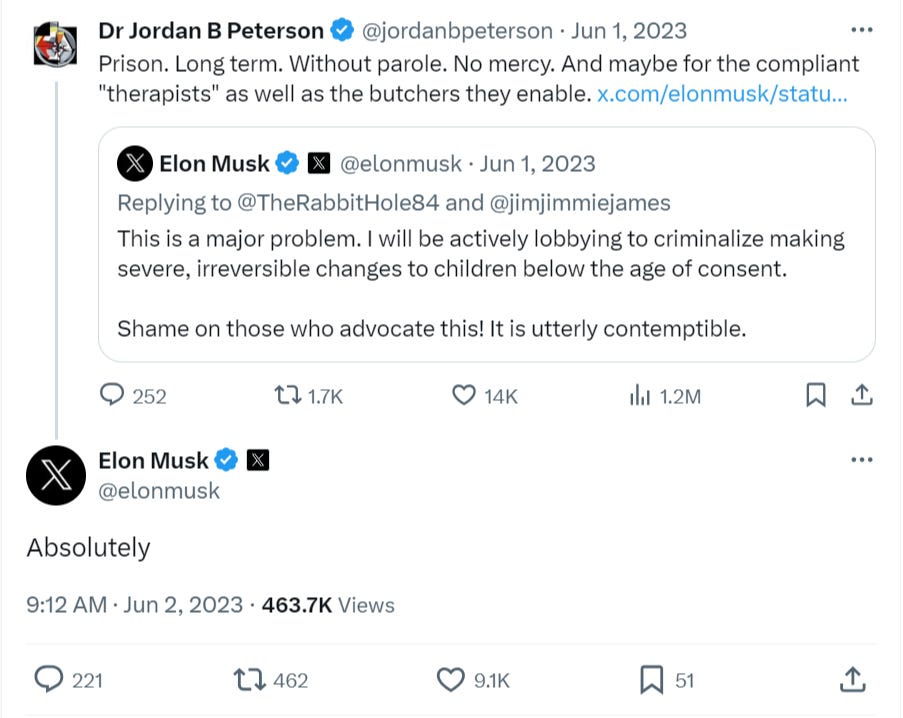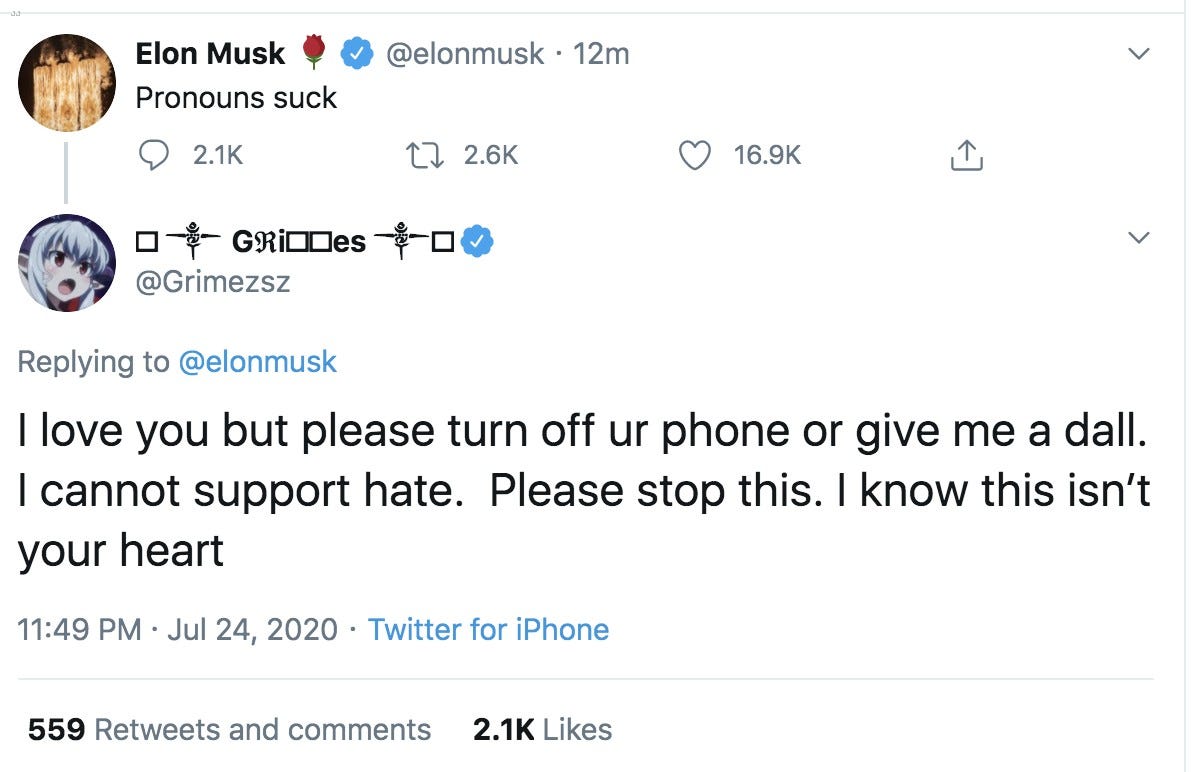The story goes like this: A weak-willed mother, empowered by the misandrist family courts and the excesses of “gender ideology,” submits an impressionable young child (usually, but not always, assigned male at birth) to radical medical experiments and “grooming,” all while the medical and legal state conspire to silence and entrap a loving father forced to watch on in horror as he loses his grip on the family order.
This is certainly the impression Adam Vena, a California man, left upon millions of viewers when he went viral over the last few months in right-wing media with his tale of paternal woe in the face of a restraining order against him filed by his ex-wife, Alexia Carbone, after he objected to their five-year-old child’s gender identity. In truth, as a report from The Los Angeles Times makes clear, is far less sympathetic:
Left out of the narrative is Vena’s alleged history of abuse toward Carbone, which she said began before any issues of gender arose with their child and is detailed in court documents reviewed by The Times.
Also left out are Vena’s outbursts in court, which a judge and his own former attorney warned would hurt his efforts to be reunified with the child. Left out are all the careful attempts by two judges, the child’s independent counsel and trained medical professionals to prioritize the youth’s needs, ideology aside.
Left out of the discussion too are the child’s thoughts and feelings, dismissed by Vena as unreliable due to age or as overly influenced by Carbone. Vena says the child — whom The Times is referring to only by the initial A., for privacy — is too young to understand gender and should just be told how to dress and act.
Reportedly, the trouble started when A. was allowed by their mother to wear a pink dress when they were 3 after persistently asking for one— a simple act of gender exploration that could certainly be a sign of transgender identity but, in practice, is just a pink dress that makes them happy. Vena reportedly responded with little hesitation:
According to Our Family Wizard messages reviewed by The Times, he confronted Carbone, asking her if it was true that A. had a pink dress. Carbone wrote back that it was.
“No You chickens—,” Vena responded. He also left Carbone a screaming voicemail, reviewed by The Times, calling her a “stupid, ignorant f—” and a “stupid f— c—.”
Carbone messaged that he was harassing her and causing emotional harm to A., who was still using male pronouns, and her other child.
“Gender does not matter. He is three and loves to dress up,” Carbone wrote. “There is absolutely nothing wrong with that and I will always encourage my children to be true to themselves.”
Vena responded by accusing Carbone of child abuse.
“You have to be a special kind of stupid to think that dressing a boy [in] girls clothes is a smart idea,” Vena wrote. “You are a f— retard.”
Hence the restraining order which was not even the first Carbone had secured against Vena. A previous request filed by Carbone made no mention of their child’s gender exploration but did detail how Vena “regularly uses physical intimidation to scare me, lunging with hands fisted, screaming in my face while I cower in the corner, punching the car dashboard or house walls and pinning me up against the car or a wall.”
It is an ugly story, familiar to anyone who has witnessed—as a spouse or as a child—a toxic and broken marriage tied together by children and the courts. It is also not the first time right-wing media and politicans have become enamored with the story of an ex-husband hoping to enforce their child’s gender assignment over the affirmative parenting of their ex-wife—often casting themselves as sympathetic patriarchs and their ex-wives as ghastly “woke” wenches.
As a trope, it combines two existential disruptions to a patriarchal worldview in both its personal and political forms. Since the rise of no-fault divorce laws in the 1960s-70s, the divorced father at war with family courts has loomed large in both conservative media and the “men’s rights” movement, enabled by the dangerous falsehood that family court are biased against men in custody determinations (they aren’t). To the state, divorce is a failure of the family to perform its neoliberal economic function and privatize the costs and risks that come with child-rearing—one reason why, as Lyz Lenz recently detailed, the state still degrades and humiliates (largely Black and poor) single mothers.
As much as divorce, a child who defies their gender assignment is an affront to masculine identities built on the subservience of wife and children, an affront to both the power men are supposed to wield over their families and the mythology granting that power. The disruption of a transgender child and the defiance of a patriarchal father is a foundational metaphor to anti-transgender politics, a keyhole look into why the very existence of transgender people writ large is seen as the last line society can cross before a domineering patriarch must take power.
Perhaps the most infamous examples of this came from Jeffrey Younger of Texas, who paraded his child’s face across right-wing media near the close of the last decade, hoping the attention he received from Texas Governor Greg Abbott and Donald Trump, Jr. would help him secure a restraining order against his ex-wife to block her from ever consenting to gender-affirming medical care for their transgender daughter (who was at the time too young to need any). After his ex was predictably targeted with death threats and harassment, a Texas court ordered him to refrain from publicizing their story further and, years later, rejected an effort by Younger to prevent his ex from moving their children to California to escape the state’s anti-transgender political environment (Younger himself unsuccessfully ran for a Texas House seat in 2022 on a QAnon plank). The Chief Justice of the Texas Supreme Court recently bemoaned the fact they did not take up that matter on behalf of Younger.
Younger’s case played no small part in fueling the ensuing 2022 effort by Abbott and Attorney General Ken Paxton to direct the state’s child welfare agency to begin investigating affirming parents of transgender youth and potentially take those children away from their custody. Since then, numerous states have proposed efforts to put their thumb on the scale of family courts and require judges to reject affirmation of a child’s gender dysphoria as in the child’s best interest, and the perverse characterization of gender-affirming medical care as “child abuse” (a claim no court in the country has ever endorsed) has entered the mainstream of Republican talking points. When Florida Governor Ron DeSantis was challenged as a presidential candidate to square his support for bans on gender-affirming medical care with his reputation as a banner carrier for “parental rights,” he promptly sent out a fundraising email lambasting “radical liberal parents” who support their child’s gender transition.
The trope of blaming the pliant mother for failing to raise children that adhere to the dominant norm is not, of course, new, and its appearance in the long history and deep present of panic over gender-deviant children shares a lineage with the history of blaming autistic children on “refrigerator mothers” or justifying the policing of Black urban families on the “matriarchal culture” of Black women. Depending on the “problem” being analyzed, the psychiatric and political state alike have a lengthy record of, when in doubt, blaming the mother for being too close or too distant, too protective or too lenient.
The first line of defense against these shortcomings is encouraging mothers to police each other and themselves. Particularly in the US (with its near-zero social safety net), mothers are trapped in a permanent state of precarity and judgment that incentivizes paranoia and distrust of all forces outside the home—be it “gender ideology” and vaccines or, for white mothers, racist fears of migrants and urban crime. As Naomi Klein writes in her 2023 book Doppelganger:
Many of these parents seem convinced that they have a right to exert absolute control over their children without any interference or input: control over their bodies (by casting masks and vaccines as a kind of child rape or poisoning); control over their minds (by casting anti-racist education as the injection of foreign ideas into the minds of their offspring); control over their gender and sexuality (by casting any attempt to discuss the range of possible gender expressions and sexual orientations as “grooming")…as I have learned in the autism parent scene, there are plenty of mothers and fathers who can’t seem to get past the shattering of their fantasies, and these are the ones who get stuck searching for cures, conspiracies, and extreme therapies that seek to ‘extinguish’ behaviors rather than understand and support them.
Consider Tania Joy Gibson, a right-wing influencer who has taken her rejection of her adult transgender son’s identity on tour. From a recent HuffPost profile of her estranged son, Renton Sinclair:
Renton doesn’t talk to Tania anymore. But Tania is always talking about Renton these days, on podcasts and livestreams and stages across the country, from California to South Dakota to Pennsylvania. She often tells the story of how God appeared to her in a dream before her first child was born, telling her what to name her child, a name with Biblical origins.
Renton is not that name. Tania refuses to call her son that name. In fact, she refuses to call her son her son. “It’s demonic,” Tania said about the existence of transgender people. “My daughter is in there, my daughter who was born and prophesied over and given the name from God is in there, but the Devil has taken and twisted her mind…”
When that fails, however—when the mother refuses to or proves incapable of upholding the gendered or social order her children persistently defy—then a more paternal level of control is deemed necessary, whether from the child’s biological father (such as in the cases of Younger and Vena) or (as in states across the country considering anti-transgender legislation and banning gender-affirming medical care) from the state itself.
In his famous description of the “strict father model” inherent to American conservative politics, the linguist and political philosopher George Lakoff compares the punitive vision of conservative politics to their vision of the father in a heterosexual family. As he writes in Moral Politics:
In addition to support and protection, the father’s primary duty is tell his children what is right and wrong, punish them when they do wrong, and to bring them up to be self-disciplined and self-reliant. Through self-denial, the children can build strength against internal evils. In this way, he teaches his children to be self-disciplined, industrious, polite, trustworthy, and respectful of authority.
The transgender child is a visceral threat to this order, not only because the child defies the “self-denial” the father is supposed to enforce against his children but because they fundamentally alter the patriarchal hierarchy that grants the father this power in the first place. It is as threatening an imposition to the father’s will over his family as the right to divorce, a subversion of both the rules-based order and the feet of clay holding up those rules by a (usually) feminine subject exerting their own agency. To the adherent of the strict father model, a transgender child is literally “de-generative” because it negates the reproduction of patriarchal power over his subjects.
For many across the right, the rise in a more sympathetic visibility of transgender people across American culture is evidence of not only the failure of men to assert their dominance over women but likewise a failure of the state to mirror that dominance. Indeed, many right-wing figures like Tucker Carlson seem to live in constant fear of feminization not only of themselves but the country writ large, casting feminism and queer rights as weakening virile Western men just as those men are trying to fight off multicultural migration and dropping white birth rates.
Take a look, for example, at the Society for American Civic Renewal, which pairs anti-feminist patriarchal theorizing with “Great Replacement” fears of non-white migrants. Founded by American businessman Charles Haywood, the secretive organization has amassed a membership strictly of married, Christian men—including the president of the influential far-right Trumpist think tank The Claremont Institute—and screens its members for their politics, their adherence to conservative Christianity, their wealth and influence, and even their role as husbands in the home.
The goal, as told through recently leaked emails among the group’s leadership, is creating a fraternal order committed to undoing the social progress of the 20th century and reasserting white, male Christian dominance in the wake of a calamitous “national divorce.”
As SACR writes in their mission statement:
Our organization seeks to recruit men of good character whose loyalties are grounded in strong virtue, correct religion, the moral life, and piety toward their forebears. Most of all, we seek those who understand the nature of authority and its legitimate forceful exercise in the temporal realm. Our conviction is that a brotherhood of these men will form the backbone of a renewed American regime that will reflect the past while facing, and vigorously shaping, the future.
Scott Yenor, the Boise State professor whose leaked emails revealed these inner workings, has warned of a “gyneocracy” and derided women who pursue careers outside the home as “more medicated, meddlesome and quarrelsome than women need to be.” Haywood, the organization’s founder, is an adherent to the racist “Great Replacement” theory and lists among his favorite books The Camp of the Saints, a neo-Nazi favorite detailing the fictional collapse of Europe to unmitigated migration from the Muslim world (it’s listed at the top of his blog alongside Walter Isaacson’s biography of Elon Musk).
SACR is, in a word, fascism. But its frequent invocation of the role of fathers—and it’s planning for a “divorce”—suggest they, too, see a relationship between one’s personal affairs and their diagnosis of American society as feminized and soft, a land of wayward children enabled and emboldened by nurturance instead of cowed by domination. It is a mindset typical of white Christian nationalism and those banning abortion, attacking transgender rights, and otherwise subverting democracy—patriarchs and their handmaidens waging war against your self-determination and your self-governance. Their policy solutions range from the public to the private—from banning books in libraries to governing your body and your family—because they see no useful separation between the two. One is an echo of the other, a national “divorce” made necessary by the wages of actual divorce.
As I’ve written before, the gender war is a forever war—there is no world in which the politicians and activists enamored with the one-sided tale of Adam Vena or Jeffrey Younger are only concerned with the minority of people who identify as transgender. The subversive nature of our existence is simply seen as an excuse for ever more policing, surveillance, and control in defense of a patriarchal order, one that will not abide a dissatisfied wife’s own agency any more than it will a transgender daughter. Like an estranged father, the would-be fascists seek to reassert power over the broader population promised to them as a birthright, described as eternal and innate yet fragile enough to be seriously challenged by something as simple and as fleeting as a happy child in a pink dress.









Articulate and well researched. Thanks for this!
I love your articles. They do such a great job dissecting and articulating the patriarchy and the damage it does to society. Especially to women and LGBTQ people.